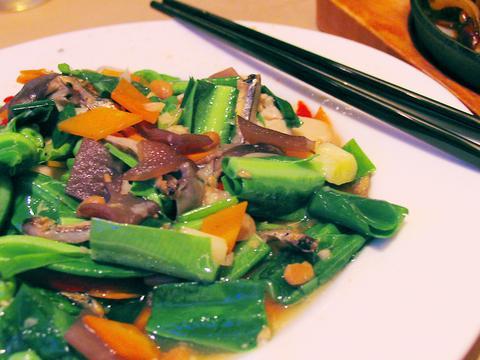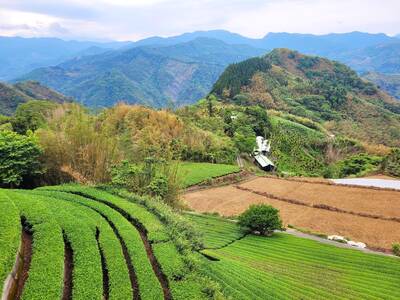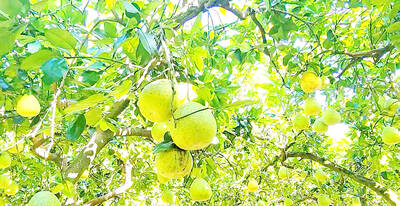Dining Room looks distinguished without seeming exclusive. The fact is it can't afford to be exclusive. Its clientele consists largely of people who -- this past weekend, at least -- had come to see the new Resident Evil movie. Not exactly a haute cuisine crowd.
It must make attempts at being distinguished for the company it shares in the Neo 19 building -- swank lounge bars and the Jakota Japanese restaurant, among others -- and for the part of town it sits in.

PHOTO: DAVID MOMPHARD, TAIPEI TIMES
In the midst of all this grandeur is Dining Room; dimly lit and Spartan. It mimics neighboring in-House with its wait staff of erstwhile models strutting the isles as if on a catwalk.
Floral arrangements sitting on a mid-room table are given the Warhol treatment: instead of one bouquet there are 12 identical ones. It's all very presentable ? and then you open the menu.
Dining Room's Chinese name would have you believe they serve Shanghai cuisine, but you won't find much of it here. The variety of carp that is a staple in hu cai (
There are some vibrant exceptions, such as a dish of wild seasonal herbs (
Like any Chinese restaurant, Dining Room is best when you're ordering for a table of four or more people, allowing you to sample from a wider variety of dishes. But even this might leave you disappointed. Of the beef, vegetable and fish dishes sampled for this review; the beef was mostly onion and the fish, a cod smothered in beans fried to a crisp (豆酥鱈魚), was tasteless. Only the seasonal wild herbs hit the spot. But who goes to a Shanghai restaurant for vegetables?
On the way out, I glanced at the other tables and saw more of what I'd left at my own table; unfinished dishes. Perhaps the anticipation of seeing Resident Evil was just too great.

On Facebook a friend posted a dashcam video of a vehicle driving through the ash-colored wasteland of what was once Taroko Gorge. A crane appears in the video, and suddenly it becomes clear: the video is in color, not black and white. The magnitude 7.2 earthquake’s destruction on April 3 around and above Taroko and its reverberations across an area heavily dependent on tourism have largely vanished from the international press discussions as the news cycle moves on, but local residents still live with its consequences every day. For example, with the damage to the road corridors between Yilan and

May 13 to May 19 While Taiwanese were eligible to take the Qing Dynasty imperial exams starting from 1686, it took more than a century for a locally-registered scholar to pass the highest levels and become a jinshi (進士). In 1823, Hsinchu City resident Cheng Yung-hsi (鄭用錫) traveled to Beijing and accomplished the feat, returning home in great glory. There were technically three Taiwan residents who did it before Cheng, but two were born in China and remained registered in their birthplaces, while historians generally discount the third as he changed his residency back to Fujian Province right after the exams.

Few scenes are more representative of rural Taiwan than a mountain slope covered in row upon row of carefully manicured tea plants. Like staring at the raked sand in a Zen garden, seeing these natural features in an unnaturally perfect arrangement of parallel lines has a certain calming effect. Snapping photos of the tea plantations blanketing Taiwan’s mountain is a favorite activity among tourists but, unfortunately, the experience is often rather superficial. As these tea fields are part of working farms, it’s not usually possible to walk amongst them or sample the teas they are producing, much less understand how the

With William Lai’s (賴清德) presidential inauguration coming up on May 20, both sides of the Taiwan Strait have been signaling each other, possibly about re-opening lines of communication. For that to happen, there are two ways this could happen, one very difficult to achieve and the other dangerous. During his presidential campaign and since Lai has repeatedly expressed his hope to re-establish communication based on equality and mutual respect, and even said he hoped to meet with Chinese leader Xi Jinping (習近平) over beef noodles and bubble tea. More dramatically, as explored in the May 2 edition of this column,